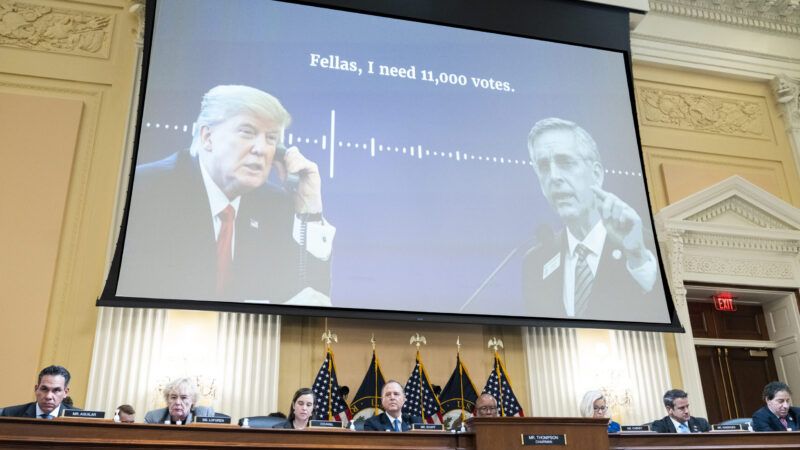The Senate's Election Reform Bill Is Surprisingly Logical and Bipartisan
Former President Trump's attempt to overturn the results of the 2020 election relied on three potential pressure points. This bill addresses all three.

Former President Donald Trump's attempt to overturn the results of the 2020 presidential election sought to exploit three potential weaknesses in the legal and political mechanisms for certifying a winner.
This week, a bipartisan group of senators formerly unveiled a proposal that, if passed, would prevent a repeat attempt from succeeding where Trump failed.
But before getting into what the proposed reforms to the Electoral Count Act would accomplish, it's probably useful to have a quick recap of how Trump (and his lawyers) attempted to undermine the existing laws, which were implemented in 1887 in response to another disputed presidential election. First, Trump pressured state election officials and state lawmakers in states where he lost, asking them to certify results showing he won. When that failed, he pressured members of Congress to object to the Electoral College results showing that Joe Biden was victorious in certain states. After that attempt didn't get enough support to succeed, he pressured (with the help of a mob) then-Vice President Mike Pence to unilaterally reject the results from supposedly disputed states.
Any one of those three plots could have resulted in Trump being declared the winner of the election on January 6, 2021—though there almost certainly would have been lawsuits asking the Supreme Court to intervene, and who knows how that would have turned out.
While a special House committee has been probing the scope of Trump's plots and the role the former president played in the ugly events of January 6, a bipartisan group of senators led by Susan Collins (R–Maine) and Joe Manchin (D–W.Va.) has been working on a fix for the procedural issues Trump's team nearly exploited to overturn the election. This is less dramatic than what the January 6th Committee has been turning up, but it is probably the more important project for the future of American democracy.
On Thursday, the group of senators released their proposal. The Electoral Count Reform and Presidential Transition Improvement Act of 2022 has a number of provisions, but the most important are aimed at those three weaknesses I've already recapped.
To prevent state lawmakers from meddling with the results of an election after it has been held, the law clarifies that states must certify their results in accordance with whatever election laws are on the books when the vote is held. Recall that much of Trump's state-level efforts in 2020 were focused on getting courts to throw out mail-in ballots—or, more accurately, to create the appearance of enough uncertainty with regard to mail-in ballots that state lawmakers could use that as grounds for certifying alternative results. Under the terms of the Senate proposal, there would be less gray area surrounding which votes are counted after an election is over. That's a good thing.
Second, the bill would set a hard deadline (six days before the Electoral College meets) for states to certify their results and would prohibit state lawmakers from submitting multiple sets of electors. If state officials don't comply, the bill sets up an expedited review process to be conducted by a panel of three federal judges, who would then certify results to the Electoral College and to Congress. The bill also mandates that Congress use the results certified by those judges in the event of a dispute later on.
When it is time for Congress to certify the Electoral College vote, the bill would raise the threshold for a formal objection—like the ones issued on January 6 by a number of Trump allies. Instead of requiring merely one representative and one senator to file an objection, it would require one-fifth of the Senate and one-fifth of the House.
In short, "the aim is to close off manipulation of the process at both the state and congressional ends," explain The Washington Post's Greg Sargent and Paul Waldman.
Finally, the bill clarifies that the vice president's role in the final congressional certification of the Electoral College vote is purely ceremonial. This has remained a point of contention since January 6, with Trump claiming publicly that Pence had the authority to unilaterally overturn the results that day, while Pence has maintained that he was not allowed to do so.
The vice president "shall have no power to solely determine, accept, reject, or otherwise adjudicate or resolve disputes over the proper list of electors, the validity of electors, or the votes of electors," the bill reads.
Whether it can pass remains unknown. The bill has nine Republican cosponsors; one shy of the 10 GOP votes that would be required (assuming all 50 Democrats in the Senate vote for the bill) to avoid the possibility of a filibuster.
In the end, of course, any law limiting or directing the behavior of public officials is only as good as the officials charged with executing it and those charged with holding each other accountable. The government is just people; flawed, selfish, and politically motivated people.
Still, these changes make a lot of sense. The bill would clarify some of the vagueness that Trump attempted to exploit and would establish clearer boundaries for every aspect of the potentially fraught vote-certification process—which, as we all learned 18 months ago, relies on officials from the local level all the way up to the vice president of the United States.
Giving the occupants of those official positions a more precise set of rules to follow doesn't guarantee that America will avoid a constitutional crisis of the kind that the country narrowly averted in the wake of the 2020 election—but it certainly won't hurt.
